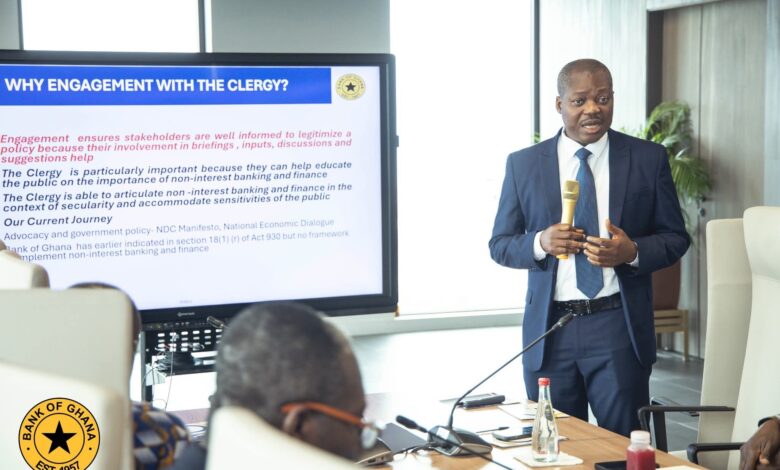BoG Taps Clergy to Drive Non‑Interest Banking, Targets Financial Inclusion

The Bank of Ghana (BoG) has signalled a major step towards diversifying the country’s financial system by deepening engagements on Non‑Interest Banking and Finance (NIBF), a model aimed at broadening access, promoting ethical finance, and meeting the needs of unbanked and faith‑based communities.
At a stakeholder engagement session with the clergy in Accra, Governor Dr. Johnson Asiama said the Bank is laying the institutional, legal, and regulatory groundwork to operationalise NIBF in Ghana. “The clergy’s input is vital,” he stressed. “Their feedback will ensure that this model reflects the values, interests, and sensitivities of Ghanaians, promoting inclusiveness and collective ownership.”
What is Non‑Interest Banking?
NIBF operates on a profit‑and‑loss sharing principle, meaning transactions do not involve interest charges. Instead, financial institutions and customers share in profits or losses under agreed‑upon terms. The model has grown into a US$5.5 trillion segment of the global financial system, widely used in project financing and microfinance.
For many Ghanaians, particularly those who avoid conventional banking due to faith or ethical concerns, NIBF offers an alternative. It allows farmers, traders, and small businesses to access capital without interest‑bearing loans, reducing barriers that keep many outside the formal financial system.
Why now?
According to Dr. Asiama, NIBF is part of BoG’s strategy to expand financial inclusion and give Ghanaians more choice in financial products. Countries such as Nigeria, Kenya, Uganda, and Tanzania have already made significant progress in NIBF, using it to bring millions of people into the banking system. Globally, major markets like the UK, Malaysia, and Singapore have embraced non‑interest models to attract diverse investments and promote sustainable finance.

Potential impact on Ghanaians
For everyday citizens, the operationalisation of NIBF could mean easier access to funds for small businesses, ethical savings and investment products for families, and new financing channels for schools, hospitals, and social enterprises. Faith‑based organisations, which often manage significant community funds, stand to benefit from products aligned with their values.
Dr. Asiama underscored the clergy’s role as long‑standing partners in financial education and community development. “We see NIBF as an additional tool for inclusive and ethical economic governance,” he said. “Your involvement ensures we build a system that works for all Ghanaians.”
The BoG will continue its stakeholder engagement series, targeting regulators, investors, and consumer groups, as it works towards launching the first phase of non‑interest banking operations in Ghana.



